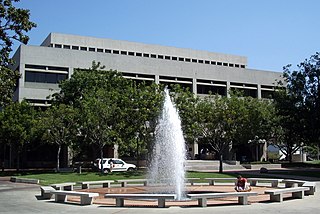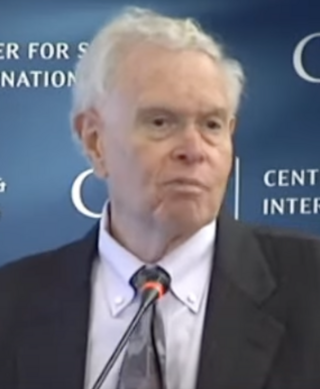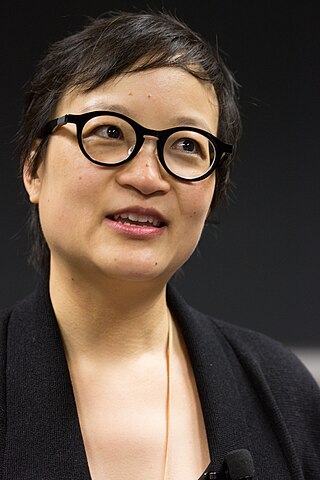Related Research Articles

The University of Chicago Law School is the law school of the University of Chicago, a private research university in Chicago, Illinois. It employs more than 180 full-time and part-time faculty and hosts more than 600 students in its Juris Doctor program, while also offering the Master of Laws, Master of Studies in Law and Doctor of Juridical Science degrees in law.

An honorary degree is an academic degree for which a university has waived all of the usual requirements. It is also known by the Latin phrases honoris causa or ad honorem . The degree is typically a doctorate or, less commonly, a master's degree, and may be awarded to someone who has no prior connection with the academic institution or no previous postsecondary education. An example of identifying a recipient of this award is as follows: Doctorate in Business Administration (Hon. Causa).

The New York University School of Law is the law school of New York University, a private research university in New York City. Established in 1835, it was the first law school established in New York City and is the oldest surviving law school in New York State and one of the oldest law schools in the United States. Located in Greenwich Village in Lower Manhattan, NYU Law grants J.D., LL.M., and J.S.D. degrees.

The University of Virginia School of Law is the law school of the University of Virginia, a public research university in Charlottesville, Virginia.
Kenji Yoshino is an American legal scholar and the Chief Justice Earl Warren Professor of Constitutional Law at the New York University School of Law. Formerly, he was the Guido Calabresi Professor of Law at Yale Law School. His work involves constitutional law, anti-discrimination law, civil and human rights, as well as law and literature, and Japanese law and society.

The USC Gould School of Law located in Los Angeles, California, is the law school of the University of Southern California. The oldest law school in the Southwestern United States, USC Law traces its beginnings to 1896 and became affiliated with USC in 1900. It was named in honor of Judge James Gould in the mid-1960s.

Kimberlé Williams Crenshaw is an American civil rights advocate and a scholar of critical race theory. She is a professor at the UCLA School of Law and Columbia Law School, where she specializes in race and gender issues.
Laura E. Gómez is a professor at the School of Law at the University of California, Los Angeles where she also holds appointments in Sociology and the Department of Chicana & Chicano Studies and Central American Studies.
Ralph Richard Banks is a professor at Stanford Law School, where he has taught since 1998. He also teaches at the Stanford Graduate School of Education. His scholarship focuses on race, inequality and the law. He published the book Is Marriage for White People?: How the African American Marriage Decline Affects Everyone in 2011.

Deborah Lynn Rhode was an American jurist. She was the Ernest W. McFarland Professor of Law at Stanford Law School and the nation's most frequently cited scholar in legal ethics. From her early days at Yale Law School, her work revolved around questions of injustice in the practice of law and the challenges of identifying and redressing it. Rhode founded and led several research centers at Stanford devoted to these issues, including its Center on the Legal Profession, Center on Ethics and Program in Law and Social Entrepreneurship; she also led the Michelle R. Clayman Institute for Gender Research at Stanford. She coined the term "The 'No-Problem' Problem".

Paul Brest is an American legal scholar who is a former president of the William and Flora Hewlett Foundation, and is dean of Stanford Law School. He is credited with coining the name originalism to describe a particular approach to interpreting the United States Constitution.
Christia Mercer is an American philosopher and the Gustave M. Berne Professor in the Department of Philosophy at Columbia University. She is known for her work on the history of early modern philosophy, the history of Platonism, and the history of gender. She has received national attention for her work teaching in prisons and advocating for educational opportunities for incarcerated people. She is the Director and Founder of the Center for New Narratives in Philosophy at Columbia University, which "supports innovative research in the history of philosophy and promotes diversity in the teaching and practice of philosophy." She is the editor of Oxford Philosophical Concepts, co-editor of Oxford New Histories of Philosophy, and was elected to serve as president of the American Philosophical Association, Eastern Division, 2019–20.

Ruth Chang is an American philosopher and legal scholar who serves as the Professor and Chair of Jurisprudence at the University of Oxford, a Professorial Fellow of University College, Oxford, and an American professor of philosophy. She was previously a professor at Rutgers University from 1998 to 2019. She is known for her research on the incommensurability of values and on practical reason and normativity. She is also widely known for her work on decision-making and is lecturer or consultant on choice at institutions ranging from video-gaming to pharmaceuticals, the U.S. Navy, World Bank, and CIA.
Jennifer Elaine Whiting is an American philosopher who teaches at the University of Pittsburgh. She has also taught at Harvard University and Cornell University, and was Chancellor Jackman Professor of Philosophy at the University of Toronto.

Nathaniel Persily is the James B. McClatchy Professor of Law at Stanford Law School, where he has taught since 2013. He is a scholar of constitutional law, election law, and the democratic process.
Stuart Alan Banner is an American legal historian and the Norman Abrams Professor of Law at the UCLA School of Law. Banner also directs UCLA's Supreme Court Clinic, which offers students the opportunity to work on real cases before the U.S. Supreme Court.
Laura E. Little is an American legal scholar and author, specializing in conflict of laws, federal courts, humor and the law, the law of freedom of expression, and constitutional law. She is the James G. Schmidt Professor of Law at Temple University School of Law.
Ariela Julie Gross is an American historian. Previously the John B. and Alice R. Sharp Professor of Law and History at the University of Southern California Gould School of Law (USC), she is now a Distinguished Professor of Law at UCLA School of Law.
Karen L. "Kerry" Abrams is an American law professor and academic administrator. She currently serves as the James B. Duke and Benjamin N. Duke Dean of the Duke University School of Law.
Vincent Blasi, born January 28, 1943, is an American legal scholar. He is the Corliss Lamont Professor Emeritus of Civil Liberties at Columbia Law School.
References
- 1 2 "Bernadette Meyler". law.stanford.edu. Stanford Law School. Retrieved July 8, 2015.
- 1 2 3 4 5 6 Fenner, Randee (November 8, 2013). "Bernadette Meyler, JD '03". Stanford Lawyer. Archived from the original on July 10, 2015. Retrieved July 8, 2015.
- 1 2 3 4 5 6 "Leading Scholar of Comparative Constitutional and Common Law Bernadette Meyler Joins Stanford Law School Faculty". SLS News (Press release). Stanford Law School. February 21, 2013.
- ↑ "Courses". law.stanford.edu. Stanford Law School. Retrieved July 8, 2015.
- ↑ "Publications". law.stanford.edu. Stanford Law School. Retrieved July 8, 2015.